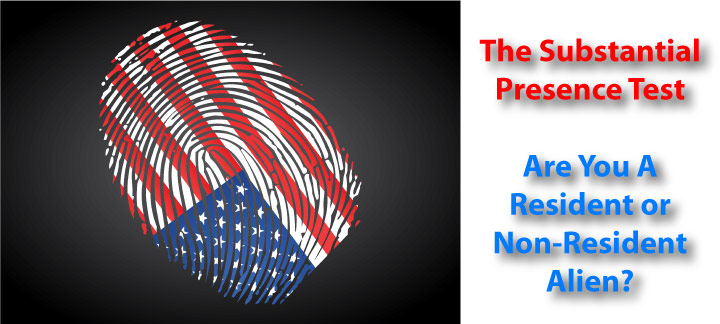What is the Substantial Presence Test for U.S. Taxation?
If you are not a U.S. citizen, you may be considered as a nonresident alien or a resident alien for tax purposes depending on the outcome of the green card test or the substantial presence test. If you do pass the substantial presence test, then you will be required to comply with applicable US and international tax laws including filing a US tax return and submitting an FBAR.
The Requirements of the Substantial Presence Test
Under the substantial presence test, you will be considered as a U.S. resident for tax purposes if you meet certain presence requirements for the calendar year. Specifically, to meet this test, you must be physically present in the United States at least: 1) 31 days during the current year, and 2) 183 days during the 3-year period that includes the current year and the 2 immediately prior years counting a) all the days you were present in the current year; b) 1/3 of the days you were present in the first year before the current year; and c) 1/6 of the days you were present in the second year before the current year. If you meet this test, you are considered as U.S. resident for tax purposes, and certain rules and regulations will apply to your tax situation. http://www.irs.gov/Individuals/International-Taxpayers/Substantial-Presence-Test
What Constitutes Days Present in the U.S. under the Substantial Presence Test?
Generally, the Substantial Presence Test counts any day that you are physically present in the United States during the calendar year, no matter the time of day. However, there are some exceptions to this rule and certain days are not counted under the test. The following are exceptions to the Substantial Presence Test, and these days are not counted: 1) Days you commute to work in the United States from a residence in Canada or Mexico if you regularly commute from Canada or Mexico; 2) Days you are in the United States for less than 24 hours when you are in transit between two places in the United States; 3) Days you are in the United States as a crew member of a foreign vessel; 4) Days that you are unable to leave the United States for a medical issue which arose while in the United States; and 5) Days you are an exempt individual. More specific rules and details exist for each of these exceptions.
What is an Exempt Individual under the Substantial Presence Test?
One of the exceptions to the Substantial Presence Test exists for exempt individuals. If you are an exempt individual, you do not count days toward the Substantial Presence Test for those days on which you are an exempt individual. An exempt individual is defined as someone in the following categories: 1) Someone temporarily present in the United States related to a foreign government under an “A” or “G” visa; 2) A teacher or trainee temporarily present in the United States under a “J” or “Q” visa; 3) A student temporarily present in the United States under an “F,” “J,” “M,” or “Q” visa; or 4) A professional athlete temporarily present in the United States in order to participate in a charity function. If you exclude days under one of these exemptions, you must complete a Form 8843. http://www.irs.gov/pub/irs-pdf/f8843.pdf
How a Tax Attorney Can Help You Understand the Substantial Presence Test
The Tax Lawyer - William D. Hartsock has been successfully helping clients comply with U.S. International Tax Laws and deal with issues related to worldwide taxation since the early 1980s. Mr. Hartsock offers free consultations with the full benefit and protections of attorney client privilege to help people clearly understand their situation and options based on the circumstances of their case. To schedule your free consultation simply fill out the contact form found on this page, or call (858) 481-4844.



Comments (0)